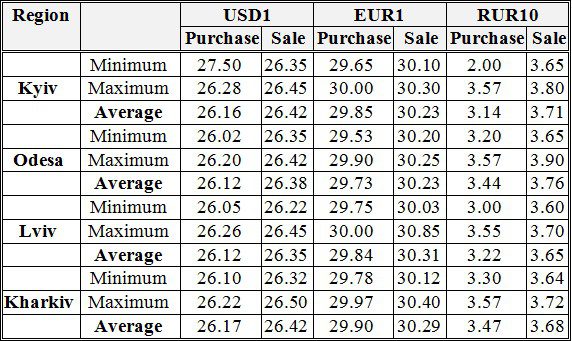Ukrainian banks’ cash exchange rates on 15/11/21

Source: Interfax-Ukraine

Suspension from work due to lack of vaccination against COVID-19 and verification of vaccination certificates in public places will be appealed in the Kyiv District Administrative Court.
According to the press service of the court, the court has registered f lawsuits against the State Space Agency of Ukraine to appeal against orders to dismiss from work. In particular, the plaintiffs ask the court to declare unlawful and cancel the orders by which they were suspended from work, and resume them at work.
In addition, the court opened proceedings on the case seeking to appeal against certain provisions of Resolution No. 1236 dated December 9, 20 on the establishment of quarantine and the introduction of restrictive anti-epidemic measures in order to prevent the spread of acute respiratory disease COVID-19 caused by the SARS-CoV-2 coronavirus in Ukraine.
In particular, the plaintiff, among other things, asks the court to cancel paragraph 18 of the said resolution regarding the granting of the right to employees of the National Police, the National Guard, officials authorized by local authorities to conduct random check of documents, as well as documents confirming vaccination against COVID-19 on the streets, in parks, other public places (catering establishments, entertainment establishments, transport).
As reported, the Cabinet of Ministers of Ukraine instructed the heads of state bodies, heads of enterprises, institutions and organizations to ensure the removal of unvaccinated employees from work from November 8 until they are vaccinated.

The number of newly registered cases of COVID-19 and the number of admissions to “covid” hospitals in Ukraine decreased over the past week amid rising incidence in Europe, Health Minister Viktor Liashko has said.“In Ukraine, we are seeing a 6% decrease in cases of coronavirus disease this week compared to the previous one. Over the past week, the number of admissions to covid hospitals has also decreased by 13%,” he said at a briefing on Monday.Liashko also noted that “for the first time in the past three months, the average daily number of discharges from “covid” hospitals prevails over the number of hospitalized.”“On average, 7% fewer patients are admitted to hospitals than discharged,” he said.Liashko believes that “the stabilization of the level of hospitalizations is the first positive signal that the peak of morbidity has passed and the beginning of unloading the medical system of Ukraine.”At the same time, he stressed the need to further increase the pace of vaccination against COVID-19 and comply with quarantine restrictions.According to Liashko, more than 16 million vaccinations against COVID-19 have been made in Ukraine over the past week. The first dose of the vaccine has already been received by 39.4% of Ukrainians, 28% have completed the course in full.

Piraeus Bank Ukraine (PBU) has provided a loan of EUR 3.1 million to the Ukrainian producer of flexible packaging Tatrafan LLC (Lutsk), and the European Bank for Reconstruction and Development (EBRD) takes half of the risk on its books under the EBRD Risk Sharing Facility (RSF), according to an EBRD press release.“The European Bank for Reconstruction and Development (EBRD) and Piraeus Bank Ukraine (PBU) are joining forces to support Tatrafan LLC, a Ukrainian producer of flexible packaging. Tatrafan will use the financing to increase its production capacity as well as to cover working-capital and capital-expenditure needs,” the EBRD said in a statement on Monday.Tatrafan is part of a broader group of companies active in the production of plastic packaging in Bulgaria, Finland and the Slovak Republic. At the facilities in Lutsk, it manufactures flexible wrapping films, which are used to produce packaging for food and for fast-moving consumer goods.According to the information on the Tatrafan website, it is a joint venture of Finnish Ab Rani Plast Oy and Slovakian Chemosvit, a.s.In 2020, OOO Tatrafan received UAH 12.35 million of net profit against a small loss a year earlier with a 48.3% reduction in revenue to UAH 324.12 million.Piraeus Bank Ukraine is a subsidiary bank of the Greek Piraeus Group. Early 2020, the EBRD organized a financing package for PBU, which included a loan in local currency of up to the equivalent of $5 million for further lending to small businesses, as well as EUR 10 million of financing under the RDP.According to the National Bank of Ukraine, as of September 1, 2021, Piraeus Bank ranked 38th in terms of total assets (UAH 4.62 billion) among 72 banks operating in the country.The EBRD is a leading institutional investor in Ukraine. To date, the Bank has invested more EUR 15.5 billion in 507 projects across the country.

Ukrainian Defense Minister Oleksiy Reznikov has said he will instruct the military to speed up the construction of the East naval base in the Azov Sea.
During a working trip to Berdiansk, Zaporizhia region, on Saturday, the minister and the Ukrainian Armed Forces chief commander Valeriy Zaluzhny inspected progress in construction of the base, berthing infrastructure and future barracks for the personnel of a separate marine infantry battalion.
“The development of our Navy in general is one of our priorities. To that end, not only public resources will be used, this will be a military diplomatic task of boosting interaction with partners. After the trip we will thoroughly analyze the current situation. Relevant instructions will be given to speed up the construction of the naval base in Berdiansk,” Reznikov said.
He recalled that two U.S. Island-class patrol boats were now en route to Ukraine.
“I will note that two Island-class boats are already on a mission as part of the national fleet. One should note our cooperation with Turkey, our strategic partner in the Black Sea. Recently, a Bayraktar unmanned system entered service in the navy and today a Turkish shipyard has started building the hull of the main ADA-class corvette for our navy. What is extremely relevant, I think, is that today the Ukrainian Navy is armed with the Neptune anti-ship [missile] system. I personally do whatever is in my control for this system to be deployed soon to patrol southern borders,” Reznikov said.

Ambassador of Ukraine to the United Kingdom Vadym Prystaiko, on behalf of the Cabinet of Ministers, signed a Ukrainian-British framework agreement providing for the allocation of funds for the construction of eight missile boats, the acquisition of two minesweepers from the United Kingdom, and the creation of two naval bases in Ukraine, the ZN.UA publication said on Saturday.
The signed agreement details the financial side of the agreements, that is the loan totaling GBP 1.7 billion provided to Ukraine by the U.K. for ten years.
Thanks to the U.K., Ukraine covers the primary needs of the country’s naval forces, which must be ready to contain Russia’s aggression from the Black and Azov Seas, ZN.UA said.
Agreements on the development and strengthening of the Ukrainian Navy were reached a year ago. During the last year’s visit of Ukrainian President Volodymyr Zelensky to London, a memorandum on strengthening cooperation between Ukraine and the United Kingdom in the military and military-technical sectors was signed. The memorandum stipulated the raising of financing from the UK’s export credit agency in the amount of GBP 1.25 billion. In the summer 2021, in Odesa, a memorandum on maritime partnership projects between the consortium of British industry and the Ukrainian Navy was signed.